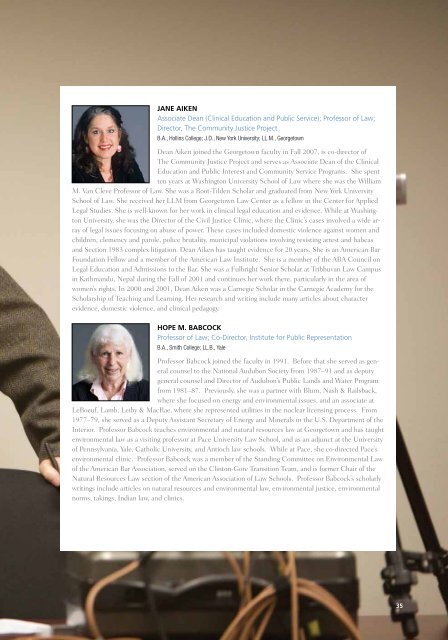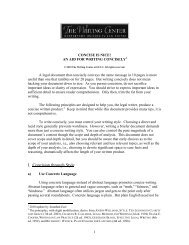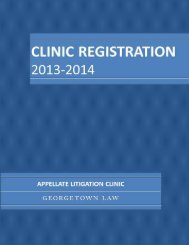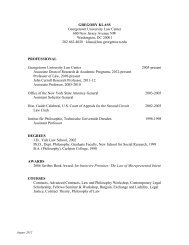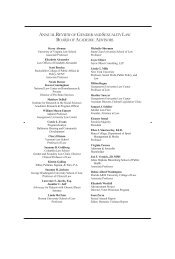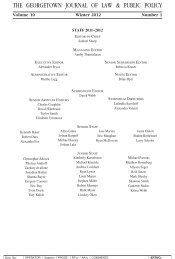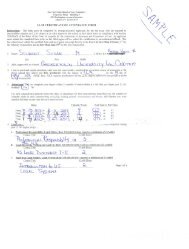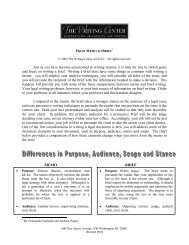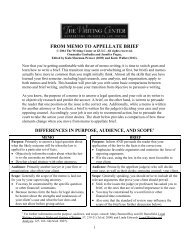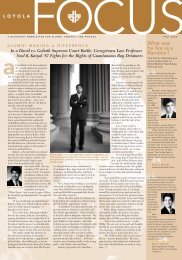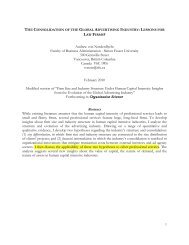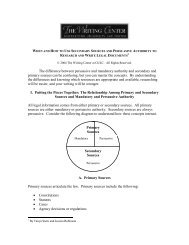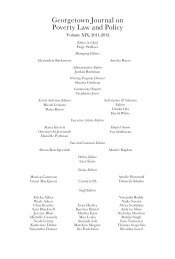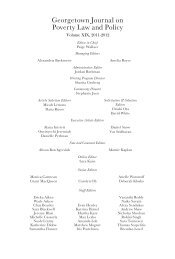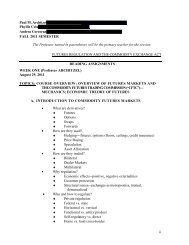experiential learning - Georgetown Law - Georgetown University
experiential learning - Georgetown Law - Georgetown University
experiential learning - Georgetown Law - Georgetown University
You also want an ePaper? Increase the reach of your titles
YUMPU automatically turns print PDFs into web optimized ePapers that Google loves.
JANE AIKEN<br />
Associate dean (Clinical Education and Public Service); Professor of <strong>Law</strong>;<br />
director, The Community Justice Project<br />
B.A., Hollins College; J.D., New York <strong>University</strong>; LL.M., <strong>Georgetown</strong><br />
Dean Aiken joined the <strong>Georgetown</strong> faculty in Fall 2007, is co-director of<br />
The Community Justice Project and serves as Associate Dean of the Clinical<br />
Education and Public Interest and Community Service Programs. She spent<br />
ten years at Washington <strong>University</strong> School of <strong>Law</strong> where she was the William<br />
M. Van Cleve Professor of <strong>Law</strong>. She was a Root-Tilden Scholar and graduated from New York <strong>University</strong><br />
School of <strong>Law</strong>. She received her LLM from <strong>Georgetown</strong> <strong>Law</strong> Center as a fellow in the Center for Applied<br />
Legal Studies. She is well-known for her work in clinical legal education and evidence. While at Washington<br />
<strong>University</strong>, she was the Director of the Civil Justice Clinic, where the Clinic’s cases involved a wide array<br />
of legal issues focusing on abuse of power. These cases included domestic violence against women and<br />
children, clemency and parole, police brutality, municipal violations involving resisting arrest and habeas<br />
and Section 1983 complex litigation. Dean Aiken has taught evidence for 20 years. She is an American Bar<br />
Foundation Fellow and a member of the American <strong>Law</strong> Institute. She is a member of the ABA Council on<br />
Legal Education and Admissions to the Bar. She was a Fulbright Senior Scholar at Tribhuvan <strong>Law</strong> Campus<br />
in Kathmandu, Nepal during the Fall of 2001 and continues her work there, particularly in the area of<br />
women’s rights. In 2000 and 2001, Dean Aiken was a Carnegie Scholar in the Carnegie Academy for the<br />
Scholarship of Teaching and Learning. Her research and writing include many articles about character<br />
evidence, domestic violence, and clinical pedagogy.<br />
HOPE M. BABCOCK<br />
Professor of <strong>Law</strong>; Co-director, Institute for Public Representation<br />
B.A., Smith College; LL.B., Yale<br />
Professor Babcock joined the faculty in 1991. Before that she served as general<br />
counsel to the National Audubon Society from 1987–91 and as deputy<br />
general counsel and Director of Audubon’s Public Lands and Water Program<br />
from 1981–87. Previously, she was a partner with Blum, Nash & Railsback,<br />
where she focused on energy and environmental issues, and an associate at<br />
LeBoeuf, Lamb, Leiby & MacRae, where she represented utilities in the nuclear licensing process. From<br />
1977–79, she served as a Deputy Assistant Secretary of Energy and Minerals in the U.S. Department of the<br />
Interior. Professor Babcock teaches environmental and natural resources law at <strong>Georgetown</strong> and has taught<br />
environmental law as a visiting professor at Pace <strong>University</strong> <strong>Law</strong> School, and as an adjunct at the <strong>University</strong><br />
of Pennsylvania, Yale, Catholic <strong>University</strong>, and Antioch law schools. While at Pace, she co-directed Pace’s<br />
environmental clinic. Professor Babcock was a member of the Standing Committee on Environmental <strong>Law</strong><br />
of the American Bar Association, served on the Clinton-Gore Transition Team, and is former Chair of the<br />
Natural Resources <strong>Law</strong> section of the American Association of <strong>Law</strong> Schools. Professor Babcock’s scholarly<br />
writings include articles on natural resources and environmental law, environmental justice, environmental<br />
norms, takings, Indian law, and clinics.<br />
35


